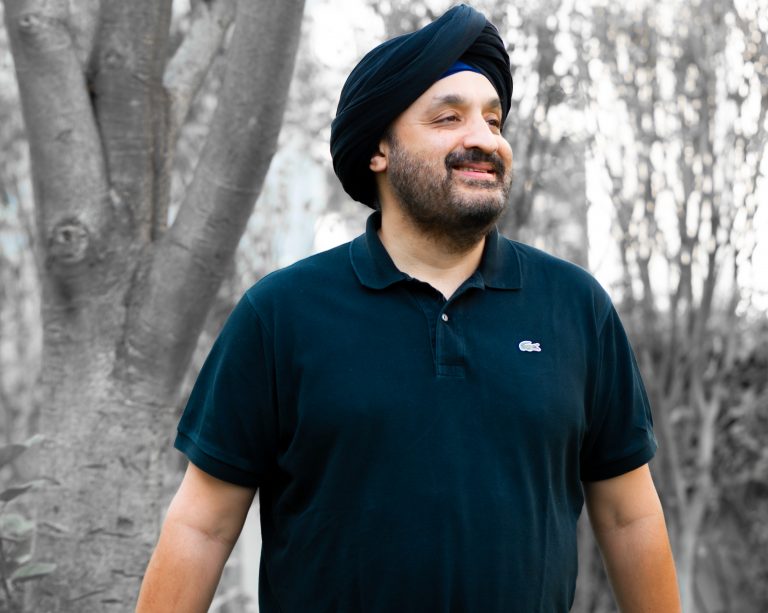The world of technology is in a constant state of flux: there’s always something new to look forward to. From the internet to the day and age of Instagram, a revolutionising concept, a groundbreaking innovation, an evolution of what was to what could be—there’s no doubt that the digital transformation in both India and the world has been tremendous over the years. Jaspreet Bindra, tech entrepreneur, thought leader, author, speaker and teacher, our very own “tech whisperer”, if we may, gives us a sense of how technology has, is and will continue to change our lives. Recounting his own journey and career trajectory, he breaks the world of tech down for us, and intrigues us every step of the way.
Jaspreet’s fascination with technology takes us back to when he was a kid and obsessed with science fiction books. “I always believed that science fiction writers could predict what was going to happen. If there’s anything you want to know about the future, 20-30 years from now, I always thought you should read science fiction books to know. In fact, one of my favourite authors, Arthur C Clarke, a huge science fiction writer, used to say something on the lines of: good technology is indistinguishable from magic… and I couldn’t agree more with him,” quips Jaspreet. So we know what drew him in way back when. But how did fascination transform into a passion and career? “I always knew technology is going to be this big force that is going to change the world, either for the good or the bad. But it was the good things that technology could potentially do for the world that made me want to stay and make it a part of my life and livelihood,” says Jaspreet.
And so his journey began. While his first job wasn’t tech related when he was with the Tata Administrative Services, very quickly Jaspreet knew his calling, which led him to embrace telecomm at the Tata Group, handling telecomm networks, new products and bringing in all the mobile tech into India in the late 90s. In 2000 he was a part of a small internet startup called baazi.com which went on to get acquired by ebay, and Jaspreet served as the COO of that company as a part of the start up team. Then in around 2005/6 he joined Microsoft and spent close to seven years at the company, straddling several integral roles. From heading Microsoft’s internet business which includes MSN, Hotmail, Messenger, “all the good things that used to be there” adds Jaspreet, to larger roles of heading Microsoft’s retail business which included Windows Office, Xbox and gaming, and also the hardware Microsoft used to make—Jaspreet’s tryst with technology at Microsoft was a substantial one. After Microsoft, he went on to merge a few tech companies, which were old, traditional companies that he bought and built a tech play out of that to launch a local search engine called Ask Me, a competitor of Just Dial. That stint didn’t survive its funding battles, but that didn’t shake Jaspreet’s resolve. He started to take on consultation roles in a variety of companies, including the Mahindra Group where he joined to contribute towards the company’s digital transformation. “I basically became a part of old-legacy companies who were yearning to become new digital companies, and was responsible for bringing in the technology, people, business models, cultures and new mindsets. Finally, in that journey I ended up joining the Mahindra Group and became the equivalent of their Chief Digital Officer, working across the spectrum of Mahindra companies: auto, hospitality, financial services and more, working to transition or transform them into more digitalised companies,” explains Jaspreet. And it was at this point in his career when he began to experiment with new technologies like block chain, artificial intelligence (AI), augmented reality (AR), virtual reality (VR) and more.
Jaspreet eventually went on to set up his own independent company. “Coming to my current avatar, I do three things essentially. Firstly, I have a small company called Digital Matters which functions as an advisory consulting service to large companies seeking digital transformation. Second, I have my own thought leadership practice which involves speaking about tech, writing about it, and even teaching it at various business schools, including global business schools. I have even written a book called The Tech Whisperer. And finally, I am building another company with a partner, which involves what people are broadly calling “the future of work”, but about this I will reveal more a few months later. So essentially, the one thing that binds all my roles together, the cornerstone or central pillar of it all, is technology and digital transformation” explains Jaspreet. He goes on to say, “I think in the last 12 years, we have seen the most amount of technological change compared to the last 100 years. If you look at what I was working on with the MSNs and the Hotmails of the world, they are what you call web 1.0 technologies—it’s like putting a magazine on the internet. Then a massive change occurred over the decade and we arrived at web 2.0 which is all about social media, where the Facebooks, Twitters, Instagrams of the world came into the picture, and where the networks completely changed and things became interactive. And now today, we are on the cusp of another massive change which is being driven by newer technologies like AI and block chain amongst others, and even the social networks will change, in the sense while twitter and Facebook built themselves on free data, now data will be much more protected and owned by the individuals. Furthermore, the individual content contributors will also earn money, unlike only the networks earning the money. So really, we are seeing the third wave, and I think the biggest story over the next 10-15-20 years is going to be about AI, block chain and the internet of things with AR and VR, and even going forward there will be quantum computing and drones. There is a huge slew of technologies coming in that did not exist 10 years ago and these technologies are just so much more powerful and world-changing than the technologies of yesteryear. Some of these new technologies will change the world more than how the internet changed the world. AI many are describing as the new electricity, or the new fire, in a sense, and that is fundamental,” exclaims Jaspreet.
Speaking about evolution and advancement, Jaspreet believes that India is in the forefront of certain technologies and up there with the rest of the world, but in some places it is trailing behind. “I think that the biggest advantage India has had from the tech viewpoint is a massive educated, english-speaking workforce and a great youth who have embraced technology in a grand way, giving rise to an IT revolution in India.” But where it may trail behind a little relative to other countries like USA, Japan, UK or China, in Jaspreet’s opinion is in AI and block chain, and the need to catch up is essential. “One of the reasons it is important to be ahead or abreast with these newer bigger technologies is that they can make very huge, fundamental improvements to our lives, especially in areas like agriculture, education, healthcare and more—and these areas will all significantly be changed by AI, block chain, IOT and more. India needs these changes, these disruptions and radical improvements,” emphasises Jaspreet.
His favourite startups in the tech space are ones we, or even you, as he believes, would not have heard of or been aware of. And it is his personal passion which drives him to seek these unique marvels out. StoryXpress is one which works on deep video tech; Hapramp is doing very exciting work on social 3.0 network; Neewee based out of Bengaluru is in the IOT space; Param in Bengaluru and Elemental Labs in Mumbai is also doing a lot of interesting work. “I am very enthusiastic about startups that are not the big ones everyone’s talking about. I like the the ones that may not be doing work for today or tomorrow, but for day after tomorrow, the future.” A lot of these startups that are Jaspreet’s favourites are involved in deep tech. Just to simplify it for everyone, we asked him to explain what deep tech is. “Deep tech is a much used and abused word these days. It basically refers to companies or startups that are working on far more tech components than others are. For example, a food company like Swiggy or Zomato relies heavily on infrastructure and people and less on technology per se, so it would not be slated as deep tech. But some of the start ups I have mentioned, they work on new tech and have a lot of components, and thus are categorised as deep tech companies.”
Jaspreet has definitely gained himself the title of being “a catalyst of change” and “India’s digital transformer”. He thinks this is because much of his speaking, teaching and writings is about the future of tech. It isn’t about the tech of today, but rather about the tech of day after tomorrow. He even has a column in the Mint called Tech Whispers, where in he only writes about how algorithms or how drones in the future will change life, and the world.
The tech trends on the horizon—Jaspreet reveals
1. Artificial Intelligence! The next 20-30-40 years belong to AI. Right now it’s just in its infancy, and can only perform very narrow tasks. Today it is actually artificial narrow intelligence. But in the next few decades it will transform into artificial general intelligence which will be the AI that you see in movies and read in books. So really, AI is going to impact everything—our life, job, education, healthcare, the way we commute, the way we talk, much like the discovery of electricity or fire impacted everything. AI could be a force for the good or bad, let’s see how it pans out.
2, Block chain! This one can be complex, but significant. Block chain is a decentralising and democratising technology. We will see a lot of centralised things getting decentralised like money, governments, land. And if used well can be a force for the good.
3. Autonomous everything! Cars, drones, planes, trucks, ships, all these things we will see working independently.
4. Space race! Elon Musk and Eros are already doing it, sending people to space—that’s going to be big!
5. Life tech! Technology related to biology and genetics—that is perhaps going to be bigger than anything else. And that will completely revolutionise medical treatments and disease prevention
6. Energy! Finally, the last big thing in tech will be about energy an how solar and wind energies will become much bigger than our conventional or electric fossil fuels. Oh, and also technology that will help curb global warming.



